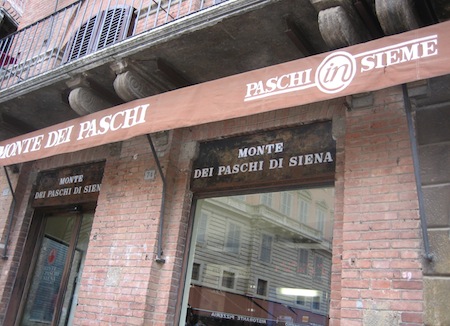Founded in 1472, it’s the oldest bank in the world, but the Bank of Monte dei Paschi di Siena has proven that it can still surprise the world, for better or worse.![]()
The news last month that Monte dei Paschi lost €730 million from dodgy financial products between 2007 and 2009 and, even worse, that the bank hid those losses were hidden from regulators, caught everyone off guard, including not only Italy’s politicians just weeks before its general election, but even Mario Draghi. Currently the head of the European Central Bank, Draghi served as the head of Italy’s central bank at the time Monte dei Paschi incurred the losses, an embarrassing oversight for the man whose ‘do-whatever-it-takes’ mantra has kept the eurozone’s sovereign debt crisis at bay since summer 2012.
Monte dei Paschi is Italy’s third-largest bank, which posted revenue of over €4 billion in 2010 before posting losses of €4.7 billion in 2011 and, as of last September, €1.7 billion in losses for 2012, a figure that’s sure to rise.
After its listing on the Italian stock exchange in 1999, it began an aggressive phase of expansion, acquiring several local banks as well as Banco Antonveneta from the Spanish bank, Banco Santander — the hidden derivatives that Monte dei Paschi entered into in order to finance those expansions are at the heart of the current scandal.
The crisis has helped no one in the Italian election — there’s enough blowback from the scandal to implicate not only Draghi’s bank regulators, but to have hurt leaders of Italy’s left, right and center at a time when disillusion among the Italian political elite is running as high as ever.
Former prime minister Silvio Berlusconi was in office at the time of the losses and neither he nor former finance minister Giulio Tremonti did anything in government to enact the kind of banking reforms that would have tightened oversight of the banking sector.
Siena, in the heart of Tuscany, is a longtime stronghold of the Italian left, and that’s exposed uncomfortably close ties between local bankers and local leftist officials — Giuseppe Mussari, the bank’s chairman from 2006 until 2012, was a local attorney with ties to the left.
The town is just a few kilometers away from Florence, whose young major Matteo Renzi is perhaps Italy’s most popular politician, and lost the prime ministerial primary last November to Pier Luigi Bersani. Siena is small enough that a nationally recognized bank like Monte dei Paschi was certain to capture much goodwill from local and regional government — even by legal means — through its oversized, centuries-long philanthropic role in the Siena community.
Furthermore, prime minister Mario Monti has also received criticism for approving a €3.9 billion bailout of the bank in 2012 at a time when everyday Italians are facing recessionary economic conditions and rising unemployment in the face of Monti-initiated tax increases.
Most immediately, it has also caused Monti and Italian president Giorgio Napolitano to reassure European leaders and global investors alike that, despite the Monte dei Paschi scandal, the Italian banking system is otherwise well-functioning and, perhaps more importantly, that Italian banking regulation remains still trustworthy. With the volatility of elections at the end of February, the scandal could well have sent Italy back into another debt crisis by spiking long-term government bond rates — the kind of crisis that felled Berlusconi and brought Monti’s technocratic government to power in November 2011.
Despite the massive losses incurred by Spanish, Portuguese, Irish, Icelandic, Greek and other banks throughout Europe, Italian banking has a relatively buttoned-down reputation. In the early and mid-2000s, the more family-run, conservative Italian banking sector limited the kind of wild speculation that overheated other European economies — indeed, Italy’s relatively slow-growth decade is a testament to the reticence of Italian bankers.
But that doesn’t mean Italy has avoided the regional economic downturn that now afflicts its more profligate neighbors alike, and it’s engendered a distrust of the Italian financial and political establishment that has fueled the rise of comedian Beppe Grillo’s Movimento 5 Stelle (M5S, the Five Star Movement), a populist, relatively anti-Europe and anti-austerity movement that promises anything but politics as usual.
Grillo, whose Five Star Movement appeared to have some polling momentum in the days leading up to February 8 — the last day that polls were permitted to be published under Italian law — which could threaten both Berlusconi’s hope to stage a comeback as the leader of a broad centrodestra (center-right) coalition and also Bersani’s centrosinistra (center-left) coalition.
Grillo, a Monte dei Paschi stockholder, has called for the bank’s nationalization.
Bersani’s centrosinistra appears to remain on track to win a plurality of the national proportional representation vote in respect of Italy’s lower house of parliament, the Camera dei Deputati (House of Deputies), and thereby, under Italian law, an automatic majority of seats. It’s trickier in the race for the upper house, the Senato (Senate), where electoral rules give a majority of seats to the winner of the plurality vote only on a region-by-region basis. So even if the centrosinistra wins a plurality of the vote nationwide, they could still fall short of a Senato majority if the centrodestra wins enough regions to take the regional seat ‘bonus.’
The regional senatorial contests are what make Grillo an unstable force — if Grillo’s movement pulls additional votes from the right, it could make it easier for Bersani to win more regions and thereby, a majority in the Senato; if Grillo’s movement pulls additional votes from the left, it could allow Berlusconi’s coalition to win more regions and thereby deny a clear majority to any party or coalition within the Senato.
Monti’s pro-reform centrist coalition has grown over the past two months, but remains in fourth place behind the two main coalitions and Grillo’s movement.
Photo credit to Kevin Lees — Siena, Italy, September 2005.
